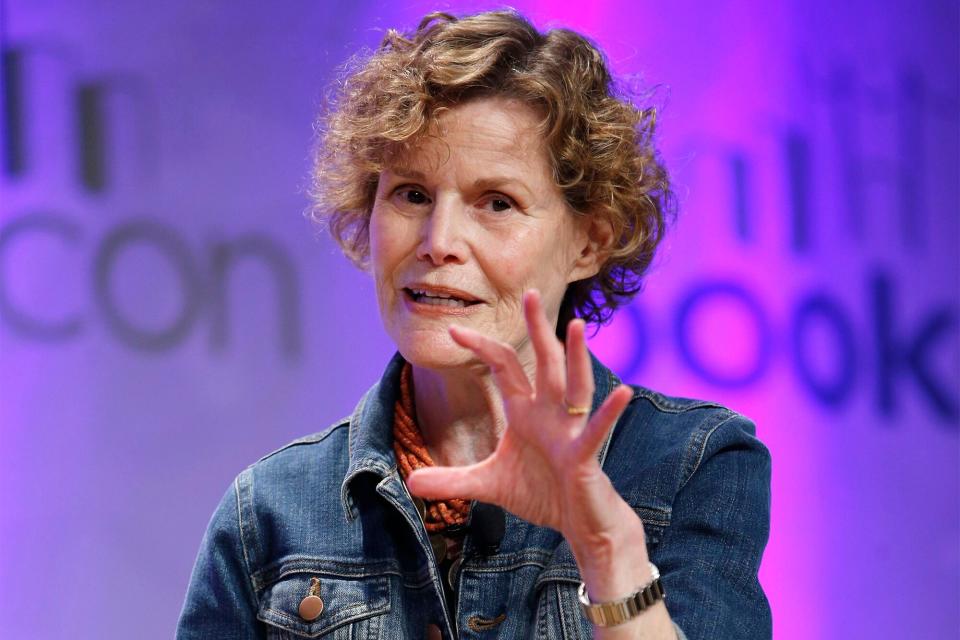Judy Blume slams censorship of Roald Dahl books: 'I don't believe in that'

Legendary author Judy Blume is speaking out against the recent decision to edit Roald Dahl's children's books to be more "inclusive."
As a writer who has dealt with censorship issues for the majority of her career, Blume "scoffed" at publisher Penguin Random House in a new interview with Variety. "What do I think about rewriting the Roald Dahl books?" Blume said. "I think if Roald Dahl was around, you would be hearing what he thinks about that. Whatever he is, whatever he's accused of being, there's a lot of truth there. But the books are the books. Kids still love the books, and they love them the way he wrote them. So I don't believe in that."

Kathy Willens/AP/Shutterstock Judy Blume
Last month, many of late author Dahl's classic books — including Charlie and the Chocolate Factory, James and the Giant Peach, The BFG, and more — had new, altered editions released with hundreds of references to body weight, gender, and race updated to "modern standards." Changes include the deletion of words "fat," "ugly," "black," and "white," as well as references to specific genders and any description of mental illness as "mad" or "crazy," in an effort to be less offensive to contemporary readers. The edits were made by "sensitivity readers" from an organization called Inclusive Minds, which is described as "a collective for people who are passionate about inclusion, diversity, equality and accessibility in children's literature, and are committed to changing the face of children's books."
Blume isn't worried about her work facing the same kind of edits. "Not as long as I'm around," she said with a smile. She's had to confront a different type of censorship in the past, as many of her iconic books, including Are You There God? It's Me Margaret, deal with teenage girls' health and sexuality.
"In the '80s is when it all broke loose, after Reagan's election," Blume said. "[A male elementary school principal] believed that menstruation wasn't a topic that girls should read about, nevermind how many kids already had their periods... It was bad in the '80s, but it wasn't coming from the government. Today, there are laws being enacted where a librarian can go to prison if she or he is found guilty of having pornography on their shelves. Try and define pornography today and you'll find that it's everything."
Blume continued, "This is the real danger. That a governor can appoint someone to the legislature who's thinking this way because he's thinking this way, and getting laws about this. We should have laws on the other side! That's why organizations that work to protect the freedom to read widely and freely are so important."
That's why Blume works so closely with the National Coalition Against Censorship, which she describes as "the little organization that could."
"NCAC is right there on the front lines," Blume said. "If a teacher, librarian, parent or student needs help as books are being challenged in their classrooms, NCAC is on the other end of the phone to help. What are you protecting your children from? Protecting your children means educating them and arming them with knowledge, and reading and supporting what they want to read. No child is going to become transgender or gay or lesbian because they read a book. It's not going to happen. They may say, 'Oh, this is just like me. This is what I'm feeling and thinking about.' Or, 'I'm interested in this because I have friends who may be gay, bi, lesbian.' They want to know!"
Blume added, "I just read a book that was wonderfully enlightening to me. It's called Gender Queer [a memoir by Maia Kobabe]. It's probably the No. 1 banned book in America right now. And I thought, 'This young person is telling me how they came to be what they are today.' And I learned a lot, and became even more empathetic.' That's what books are all about."
Related content:
Authors criticize decision to edit Roald Dahl's books to be more inclusive
Roald Dahl's family apologizes for 'understandable hurt' caused by author's anti-Semitic comments
Matilda the Musical trailer delivers a dark but soaring take on the Roald Dahl classic
Witches, weirdos, and Wonkas: How to do a Roald Dahl adaptation right


